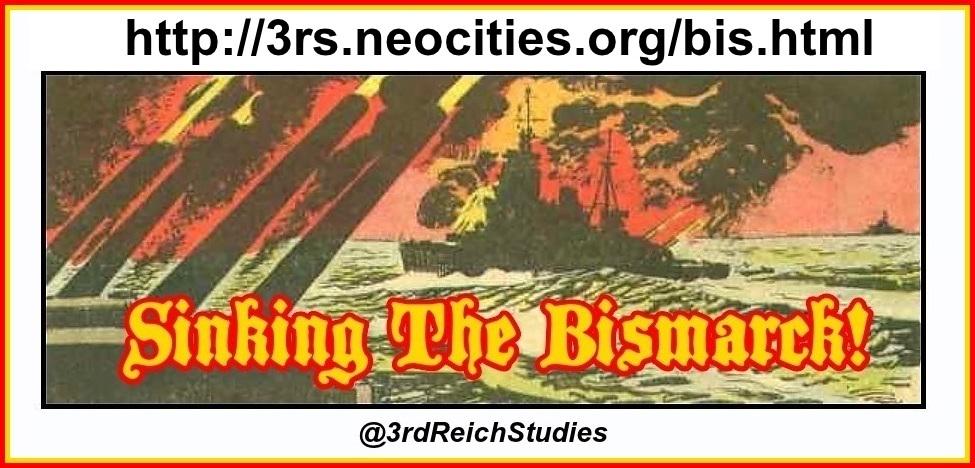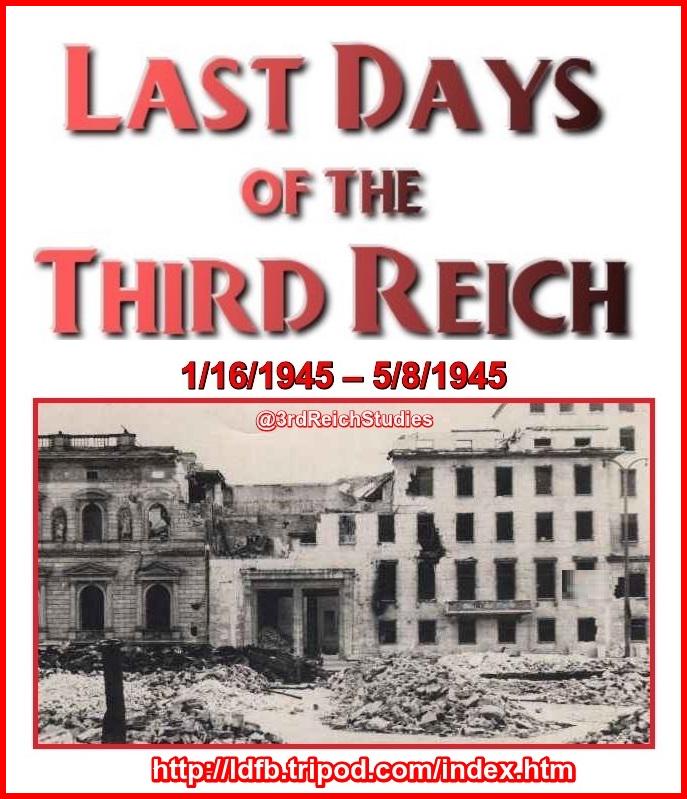 Copyright © 2011-2013
Walther Johann von Löpp
All Rights Reserved
Copyright © 2011-2013
Walther Johann von Löpp
All Rights Reserved
 Twitter: @3rdReichStudies
FB: Horrific 20th Century History
Twitter: @3rdReichStudies
FB: Horrific 20th Century History




The Propagander ™ FAQ
How Did Baldur von Schirach Avoid the Noose?
I did not make any inflammatory anti-Semitic speeches, since I attempted, both as Reich Youth Leader and youth educator, not to add fuel to the fire; for neither in my books nor in my speeches--with the exception of one speech in Vienna, to which I shall refer later on and which was not made at the time when I was Reich Youth Leader--have I made any inflammatory statements of an anti-Semitic nature. I will not make myself ridiculous by stating here that I was not an anti-Semite; I was--although I never addressed myself to the youth in that sense.
Below is an excerpt from the speech von Schirach mentions above, and in fact is the most damaging piece of documentation against him:Every Jew who exerts influence in Europe is a danger to European culture. If anyone reproaches me with having driven from this city, which was once the European metropolis of Jewry, tens of thousands upon tens of Thousands of Jews into the ghetto of the East, I feel myself compelled to reply, "I see in this an action contributing to European culture."
Streicher said worse before breakfast. He would have laughed had he been confronted with a similar quote attributed to himself, and would no doubt have opined that he had only been speaking the truth. In contrast, here is how Schirach responded when confronted with this quote:First, I want to say that I did make that speech. The quotation is correct. I said that. I must stand by what I have said. Although the plan of the deportation of the Jews was Hitler's plan and I was not charged with its execution, I did utter those words, which I now sincerely regret; but I must say that I identified myself morally with that action only out of a feeling of misplaced loyalty to the Fuehrer. That I have done, and that cannot be undone. If I am to explain how I came to do this, I can only reply that at that time I was already "between the Devil and the deep sea.
I believe it will also become clear from my later statements that from a certain moment on I had Hitler against me, the Party Chancellery against me, and very many members of the Party itself against me. Constantly I heard from officials of the Party Chancellery who expressed that to the Gauleiter of Vienna, and from statements made in Hitler's entourage that one was under the impression--and that this could be clearly recognized from my attitude and my actions--that I was no longer expressing myself publicly in the usual anti-Semitic manner or in other ways, either; and I just have no excuse. But it may perhaps serve as an explanation, that I was trying to extricate myself from this painful situation by speaking in a manner which today I can no longer justify to myself.
The difference between Hitler and myself arose primarily over an art exhibition, and the breach between Hitler and myself in 1943 was in the beginning the result of differences of opinion over the cultural policy. In 1943 I was ordered to the Berghof where Hitler, in the presence of Bormann, criticized me violently on account of my cultural work and literally said that I was leading the cultural opposition against him in Germany. And further, in the course of the conversation he said that I was mobilizing the spiritual forces of Vienna and Austria and the spiritual forces of the young people against him in cultural spheres. He said he knew it very well indeed. He had read some of my speeches, primarily the Duesseldorf speech; he had discovered that I had authorized in Weimar and in Vienna art exhibitions of a decadent nature; and he offered me the alternative, either to end this kind of opposition work immediately--then for the time being everything could remain as in the past--or he would stop all Government subsidies for Vienna.
This scene made a frightful impression on me, for it represented to me a breach of Hitler's promised word, since he had granted me absolute freedom of action when he appointed me to the Vienna mission. I then recognized that he nourished an icy hatred toward me, and that behind these statements on cultural policies something else was concealed. Whether he was dissatisfied in every detail with the way I conducted my office in Vienna at the time, I do not know. He rarely expressed himself directly about such matters. From his entourage I learned only of occasional happenings.
I then--and that led to the complete and final break between Hitler and myself a few weeks after I had received this order, if I may call it so, received a strange invitation for myself and my wife to spend some time on the Berghof. At that time I innocently believed that Hitler wished to bridge the gap between us and to let me know, in one way or another, that he had gone too far. In any case, at the end of a 3 days' visit--I cut my stay short--I discovered that this was a fundamental error on my part. Here I will limit myself to a few points only. I had intended--and I also carried out my intention--to mention at least three points during my visit. One was the policy toward Russia, the second was the Jewish question, and the third was Hitler's attitude toward Vienna.
I must state, to begin with, that Bormann had issued a decree addressed to me, and probably to all the other Gauleiter's, prohibiting any intervention on our part in the Jewish question. That is to say, we could not intervene with Hitler in favor of any Jew or half-Jew. That too was stated in the decree. I have to mention this, since it makes matters clearer.
On the first evening of my stay at the Berghof, on what appeared to me a propitious occasion, I told Hitler that I was of the opinion that a free and autonomous Ukraine would serve the Reich better than a Ukraine ruled by the violence of Herr Koch. That was all I said, nothing more, nothing less. Knowing Hitler as I did, it was extremely difficult even to hazard such a remark. Hitler answered comparatively quietly but with pronounced sharpness. On the same evening, or possibly the next one, the Jewish question was broached according to a plan I made with my wife. Since I was forbidden to mention these things even in conversation, my wife gave the Fuehrer a description of an experience she had had in Holland. She had witnessed one night, from the bedroom of her hotel, the deportation of Jewish women by the Gestapo. We were both of the opinion that this experience during her journey and the description of it might possibly result in a change of Hitler's attitude toward the entire Jewish question and in the treatment of the Jews. My wife gave a very drastic description, a description such as we can now read in the papers.
Hitler was silent. All the other witnesses to this conversation, including my own father-in-law, Professor Hoffmann, were also silent. The silence was icy, and after a short time Hitler merely said, "This is pure sentimentality." That was all. No further conversation took place that evening. Hitler retired earlier than usual. I was under the impression that a perfectly untenable situation had now arisen. Then the men of Hitler's entourage told my father-in-law that from now on I would have to fear for my safety. I endeavored to get away from the Berghof as quickly as possible without letting matters come to an open break, but I did not succeed.
Then Goebbels arrived on the next evening and there, in my presence and without my starting it, the subject of Vienna was broached. I was naturally compelled to protest against the statements that Goebbels at first made about the Viennese. Then the Fuehrer began with) I might say, incredible and unlimited hatred to speak against the people of Vienna. I have to admit, here and now, that even if the people of Vienna are cursing me today, I have always felt very friendly toward them. I have felt closely attached to those people. I will not say more than that Joseph Weinheber was one of my closest friends. During that discussion, I, in accordance with my duty and my feelings, spoke in favor of the people under my authority in Vienna.
At 4 o'clock in the morning, among other things, Hitler suddenly said something that I should now like to repeat for historical reasons. He said, "Vienna should never have been admitted into the Union of Greater Germany." Hitler never loved Vienna. He hated its people. I believe that he had a liking for the city because he appreciated the architectural design of the buildings on the Ring. But everybody who knows Vienna knows that the true Vienna is architecturally Gothic, and that the buildings on the Ring are not really representative . . . .
I only want to say that so total a break resulted from that discussion--or, rather explosion--of Hitler's that on that very night at about 0430 I took my leave and left the Berghof a few hours later. Since then I had no further conversations with Hitler."
Nicolaus von Below, Hitler's long-time adjutant, wrote of the split from Hitler's perspective. Hitler had told Below that, while the above disputes with Schirach were annoying, what really set him off was that Schirach had insisted that the war was lost and that a way should be found to put an end to it.
"How does he [Schirach] imagine that [ending the war] can be done?" Hitler [indignantly told me]. "He knows just as well as I that there is no way out anymore, other of course than my shooting myself." . . . . Hitler was very put out over this conversation with Schirach, and made very plain that he wanted nothing more to do with him. And indeed it was their last encounter.
The court considered such insider gossip compelling, and took what can only be considered undue notice of such tales. In von Schirach's case, other Defendants were more than willing to contribute to the narrative:At that time the Fuehrer had not been kindly disposed to von Schirach for several months and had repeatedly considered withdrawing him from office. He said on this occasion--and that is how I came into possession of this letter, for he handed it to me: "Schirach seems to plan for his future protection. I have a certain suspicion." Then, in the presence of Bormann, I told the Fuehrer very clearly and definitely that this was entirely unfounded; that I could not understand his attitude toward Schirach, and that Schirach had done the only possible and decent thing when, before dismissing any of his collaborators or subordinates for such reasons, he demanded the clarification of his own position, since his connections were known; and that, in my opinion, this letter had no other purpose . . . . I know that Bormann and Himmler were opposed to Schirach. Whether they wanted to give this letter an entirely different interpretation in order to induce the Fuehrer to recall Schirach and eliminate him, and how far Himmler's suggestion went, whether protective custody was considered, I do not know. But I heard about these things from other sources later on.
From Schirach's IMT testimony:I must now refer to something else in this connection. Reich Marshal
Goering, in the witness box, mentioned a letter of mine which Hitler had shown him, and Herr von Ribbentrop has stated here that he was present at a conversation during which Himmler suggested to Hitler that I be indicted before the People's Court, which meant in reality that I should be hanged. I must add one thing more: What Goering said about this letter is mainly true. I wrote in quite a proper manner about family relations in that letter. I also wrote one sentence to the effect that I considered war with America a disaster . . . .Gilbert had gone on to say that Schirach's early rise to power had gone "to his romantic head" and that he was now "disillusioned at what he feels to be the betrayal of German youth by the elder leaders." Gilbert had actively nurtured this disillusionment in recent months . . . . It is hard to believe that Gilbert was acting purely on his own initiative. Others beside must have seen an advantage in persuading the former leader of those young people to reject the training they had received and set them on a less dangerous path for the future. Should German youth come to share Schirach's disillusion, Germany would be easier to settle and incorporate into the European community. But there is no evidence to show that Gilbert discussed his strategy with others. Nor is there a hint anywhere that a bargain was considered. On the contrary, the prosecution records suggest that every effort was made to secure the maximum sentence. Gilberts diary shows Schirach struggling with his conscience, until deciding in early May that he had one last mission to the young people of Germany--to denounce Hitler before he died. He got his courage to the sticking point in the witness box around mid-morning on 24 May. He was noticeably ashen-faced.
Below is the testimony that probably saved von Schirach's life:It [Auschwitz] is the greatest, the most devilish mass murder known to history. But that murder was not committed by Hoess; Hoess was merely the executioner. The murder was ordered by Adolf Hitler, as is obvious from his last will and testament. The will is genuine. I have held the photostat copy of that will in my hands. He and Himmler jointly committed that crime which, for all time, will be a stain in the annals of our history. It is a crime which fills every German with shame.
The youth of Germany is guiltless. Our youth was anti-Semitic ally inclined, but it did not call for the extermination of Jewry. It neither realized nor imagined that Hitler had carried out this extermination by the daily murder of thousands of innocent people. The youth of Germany who, today, stand perplexed among the ruins of their native land, knew nothing of these crimes, nor did they desire them. They are innocent of all that Hitler has done to the Jewish and to the German people.
I should like to say the following in connection with Hoess' case. I have educated this generation in faith and loyalty to Hitler. The Youth Organization which I built up bore his name. I believed that I was serving a leader who would make our people and the youth of our country great and happy and free. Millions of young people believed this, together with me, and saw their ultimate ideal in National Socialism. Many died for it. Before God, before the German nation, and before my German people I alone bear the guilt of having trained our young people for a man whom I for many long years had considered unimpeachable, both as a leader and as the head of the State, of creating for him a generation who saw him as I did. The guilt is mine in that I educated the youth of Germany for a man who murdered by the millions. I believed in this man, that is all I can say for my excuse and for the characterization of my attitude. This is my own--my own personal guilt.
I was responsible for the youth of the country. I was placed in authority over the young people, and the guilt is mine alone. The younger generation is guiltless. It grew up in an anti-Semitic state, ruled by anti-Semitic laws. Our youth was bound by these laws and saw nothing criminal in racial politics. But if anti-Semitism and racial laws could lead to an Auschwitz, then Auschwitz must mark the end of racial politics and the death of anti-Semitism. Hitler is dead. I never betrayed him; I never tried to overthrow him; I remained true to my oath as an officer, a youth leader, and an official. I was no blind collaborator of his; neither was I an opportunist. I was a convinced National Socialist from my earliest days--as such, I was also an anti-Semite. Hitler's racial policy was a crime which led to disaster for 5,000,000 Jews and for all the Germans. The younger generation bears no guilt. But he who, after Auschwitz, still clings to racial politics has rendered himself guilty. That is what I consider my duty to state in connection with the Hoess case.
During the statement Gilbert had noticed the tension in the dock:
Frank, Funk and Raeder dabbing their eyes, Streicher sneering. When Schirach went down to lunch he was congratulated by Fritzsche, Funk and Speer, and in their own room Papen, Neurath and Schacht agreed he was perfectly right in his judgement of Hitler. Goering had not been in court; he was excused on grounds of indisposition. Gilbert suspected that Goering was unwilling to sit through the embarrassment of hearing what Schirach was going to say. That evening Goering complained in equal measure of 'treachery' and 'sciata'--evidently suffering from all kinds of stabs in the back.Copyright © 2011-2013 Walther Johann von Löpp All Rights Reserved
Twitter: @3rdReichStudies FB: Horrific 20th Century History




Featured Sites:Austria: The Other GermanyThe Last Days of the Third ReichAdolf Hitler: The First Super-VillianThird Reich History: What Happened Today?Countdown to Infamy: Timeline to Pearl HarborBiographical Timeline: of the Infamous Adolf HitlerCountdown To WW2: August 22 - September 1, 1939The Nuremberg Nazis: Detailed, Documented BiographiesWunderwaffen: Hitler's Deception and the History of RocketryMain Sites:
Adolf Hitler: The VolkswagenAdolf Hitler: The Fuehrer's MercedesAdolf Hitler: Mein Kampf ExaminedIn the Shadow of Frederick the GreatHitler's Battleship: Sink The Bismarck!Non-Fiction Comics: Military PeriodicalsHistory of Olympic Boycotts: From Berlin to BeijingHogan's Jews: 5 Cast Members Were Jews; Their Stories



















Disclaimer: The Propagander!™ includes diverse and controversial materials--such as excerpts from the writings of racists and anti-Semites--so that its readers can learn the nature and extent of hate and anti-Semitic discourse. It is our sincere belief that only the informed citizen can prevail over the ignorance of Racialist "thought." Far from approving these writings, The Propagander!™ condemns racism in all of its forms and manifestations.
Fair Use Notice: The Propagander!™may contain copyrighted material the use of which has not always been specifically authorized by the copyright owner. We are making such material available in our efforts to advance understanding of historical, political, human rights, economic, democracy, scientific, environmental, and social justice issues, etc. We believe this constitutes a "fair use" of any such copyrighted material as provided for in section 107 of the US Copyright Law. In accordance with Title 17 U.S.C. Section 107, the material on this site is distributed without profit to those who have expressed a prior interest in receiving the included information for research and educational purposes. If you wish to use copyrighted material from this site for purposes of your own that go beyond 'fair use', you must obtain permission from the copyright owner.
